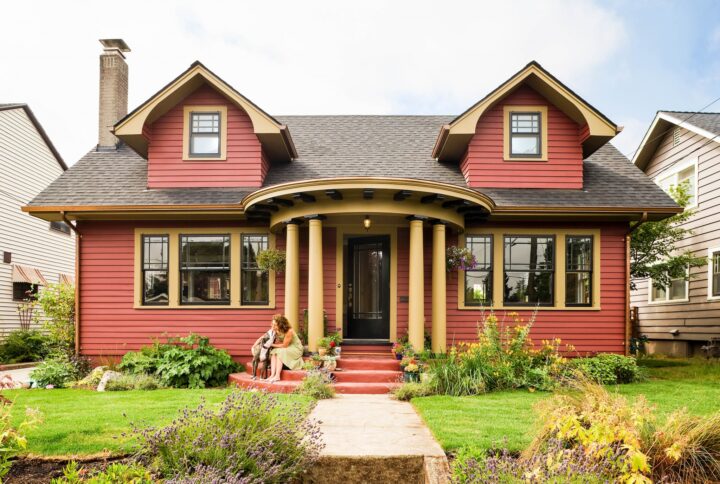What Is a Balloon Payment Mortgage?


Written by Vivian Tejada on February 17, 2025
Reviewed by Neil Swanson, Edited by Jessica Rapp
A balloon payment mortgage is a home loan that requires smaller monthly payments at the beginning of the loan term, followed by a lump sum payment at the end of the loan term. Balloon mortgages typically have loan terms of five to seven years, although some balloon mortgages come with 10-year terms.
In this article, we’ll discuss how balloon payments are structured, and how they work. We’ll also cover the pros and cons of balloon mortgages, and how to avoid a balloon payment.
How do balloon payments work?
Balloon payment mortgages work differently than traditional mortgages. The key difference between a balloon payment mortgage and a traditional mortgage is the way the loan amortizes. Unlike traditional loans, balloon mortgages aren’t structured for borrowers to pay off the loan by the end of the loan term. Instead, the majority of the loan balance is paid at the maturity date in a single, balloon payment.
How much you owe at the end of the loan term depends on the type of balloon payment mortgage you took out. Balloon payment mortgages might require you to pay a portion of the principal, the total principal, or the total principal and interest accrued. In any case, the amount paid will be substantial. Balloon mortgages often have higher interest rates and stricter credit requirements than traditional loans. Lenders might also require borrowers to have a certain amount of assets or cash reserves.
Balloon payments don’t just apply to mortgages, but also auto and business loans. Similar to a balloon mortgage, auto loans allow borrowers to make smaller monthly payments throughout the loan term and finalize the loan with a final balloon payment. Balloon payments on auto loans are usually half the amount borrowed. Business loans might also come with balloon payments at the end of the loan term, but are usually significantly higher than the monthly payments made throughout the life of the loan.
Types of balloon payments
All balloon mortgages require small monthly payments for five to seven years, followed by a large lump sum payment at the end of the loan term. However, the way these payments are allocated differs based on the type of balloon mortgage you obtain.
Interest and principal payment
An amortizing mortgage loan includes interest and principal payments. Monthly payments are calculated based on a typical 30-year amortization schedule, even though the loan term is only five to seven years long. At the end of the loan term, the borrower pays the remaining balance in one lump sum, balloon payment.
Interest-only payments
Borrowers can also take out an interest-only mortgage, during which they only pay interest for the loan term. At the end of the loan term, the borrower pays back the total amount borrowed.
No payments
Some lenders allow no-payment balloon mortgages, where the borrower doesn’t make any monthly payments throughout the loan term, but they accrue interest on the amount borrowed. At the end of the loan term, the borrower pays back the principal and interest owed in a large lump sum.
When is a balloon payment due?
The balloon mortgage payment is due on the loan’s maturity date. If you take out a balloon mortgage with a seven-year loan term, the balloon payment is due once seven years have elapsed. When a balloon payment is due, the borrower must pay the loan’s remaining balance in a lump sum. Balloon payment schedules differ depending on the type of balloon payment mortgage you have.
Example of a balloon mortgage payment:
Here’s an example of a balloon payment on an amortizing mortgage loan with principal and interest payments. Assume you get a 10-year balloon mortgage for $350,000 at 4.5%. Your monthly payments would be $1,773.40, consisting of some principal but mostly interest. You’ll pay the bulk of the principal — in this scenario, $288,771.89 — at the end of the loan term.
Amortization schedule for a mortgage with a balloon payment
| Year | Total Payments | Principal Paid | Interest Paid | Ending Principal |
|---|---|---|---|---|
| 0 | $0 | $0 | $0 | $350,000 |
| 1 | $21,280.80 | $5,646.31 | $15,634.49 | $344,353.69 |
| 2 | $21,280.80 | $5,905.70 | $15,375.09 | $338,447.98 |
| 3 | $21,280.80 | $6,177.02 | $15,103.78 | $332,270.96 |
| 4 | $21,280.80 | $6,460.77 | $14,820.03 | $325,810.19 |
| 5 | $21,280.80 | $6,757.59 | $14,523.21 | $319,052.60 |
| 6 | $21,280.80 | $7,068.04 | $14,212.76 | $311,984.56 |
| 7 | $21,280.80 | $7,392.72 | $13,888.08 | $304,591.84 |
| 8 | $21,280.80 | $7,732.36 | $13,548.44 | $296,859.48 |
| 9 | $21,280.80 | $8,087.59 | $13,193.21 | $288,771.89 |
| 10 | $301,593.58 | $288,771.89 | $12,821.69 | $0 |
Pros and cons of balloon mortgages
Balloon mortgages are often pursued by borrowers who expect to sell or refinance their homes before the balloon payment is due. Before taking out a balloon mortgage, it’s important to understand its potential benefits and drawbacks.
Pros
- Borrowers enjoy low, or no monthly payments throughout the loan term.
- Shorter loan terms could mean less interest payments over the life of the loan.
- There are usually no prepayment penalties on balloon payment mortgages, allowing borrowers to make extra payments and pay off their loans early.
Cons
- Balloon mortgages are hard to acquire. Not many mortgage lenders offer them.
- Interest rates on balloon mortgages, whether fixed or variable, are usually higher than rates on traditional home loans.
- If you’re unable to make the required balloon payment at the end of the loan term and don’t have enough equity to refinance, you might have to sell the home. Borrowers who are making interest-only payments might be more at risk.
How to avoid a balloon payment
If you think you won’t be able to make a balloon payment by your loan’s maturity date, you have a few options.
Explore prepayment options
Prepayment penalties on balloon mortgages are rare, which means you can start paying down your principal as early as you’d like. Making additional payments throughout the life of the loan can help reduce your loan principal, which would ultimately reduce your balloon payment amount. Paying down more of your loan principal could also increase your home equity, making it easier to refinance when the loan matures.
Negotiate an extension
Some lenders may be willing to push out your maturity date if certain conditions are met. However, balloon payment extensions often come with significant fees and aren’t that long.
Refinance
Refinancing a balloon mortgage into a conventional, fixed-rate mortgage is a common way for borrowers to avoid balloon payments. However, this strategy only works when you’ve accumulated enough home equity to qualify for a mortgage refinance, usually 15-20%. Borrowers also need to have steady income or assets, and a good credit history.
We at Zillow Home Loans* offer several refinance options. Check us out or speak with one of our loan officers to learn more.
Sell the home
As a last resort, you have the option to sell the home. Selling the property can help you avoid defaulting on the loan and facing foreclosure. Borrowers can then use the proceeds from the sale to pay off the balloon payment. House flippers typically use this strategy to avoid a mortgage balloon payment at the end of the loan term.
*An equal housing lender. NMLS #10287
How much home can you afford?
At Zillow Home Loans, we can pre-qualify you in as little as 5 minutes, with no impact to your credit score.
Zillow Home Loans, NMLS # 10287. Equal Housing Lender
Get pre-qualifiedHow much home can you afford?
See what's in reach with low down payment options, no hidden fees and step-by-step guidance from us at
Zillow Home Loans.
Zillow Home Loans, NMLS # 10287. Equal Housing Lender
Calculate your BuyAbility℠



